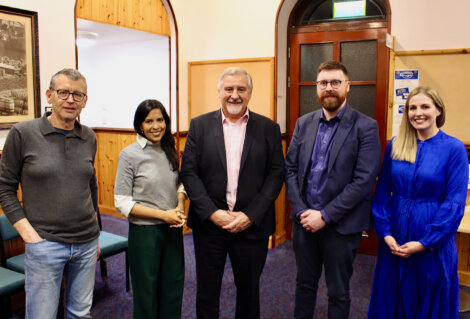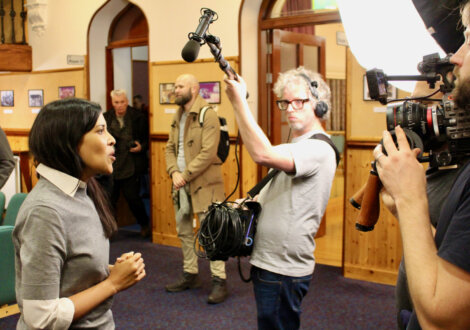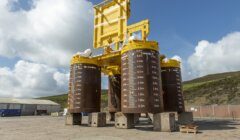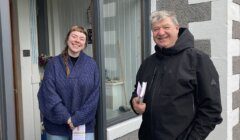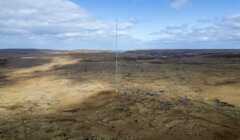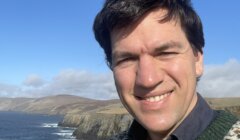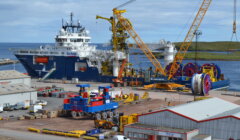Climate / Plenty to talk about at net zero discussion event
NEW oil and gas developments, hydrogen production, peatland restoration, wind farms – these were just some of the many topics brought up in a busy discussion event about net zero held in Lerwick on Wednesday night.
The event, hosted by Shetland News, looked to explore how Shetland – and the country – can go ‘net zero’ by 2045.
It was perhaps best explained by one of the four panellists, ORION project manager Gunther Newcombe, who described it is a like a “big jigsaw puzzle” with many elements and solutions needing to be slotted together.
Also on the panel was Tessa Khan, the founder of Uplift, an organisation that supports a rapid and just transition away from fossil fuels in the UK.
Joining Newcombe and Khan were Daniel Gear, outgoing general manager responsible for the local operation of energy logistics company Peterson, and Shetland Islands Council’s climate change strategy team leader Claire Ferguson.
There also happened to be a film crew from TV network Bloomberg capturing the meeting whilst they follow Khan on her visit to Shetland.
It is fair to say Shetland is uniquely placed in the global push to reduce emissions, having benefitted financially from oil and gas for decades.
But it is now looking to be at the forefront of future energy – not only wind power but through possible industrial scale hydrogen production too.
Whilst the panel was agreed on the need to reduce emissions – and quickly – perhaps the more contentious topic was whether to continue with new oil and gas developments around Shetland, such as Cambo and Rosebank.
Gear opened the event first, saying we need to reduce fossil fuel consumption to the “irreducible minimum” in a fair and efficient way.
But he questioned whether not going ahead with Cambo and Rosebank would result in greater emissions through the UK having to import more oil.
Become a member of Shetland News
“If Cambo and Rosebank are produced, will that result in a net increase in global oil demand?” he asked.
Gear said if the answer is yes, then they should not be produced – and if net demand will stay the same, he said you could make a case for them being produced.
He also highlighted the challenges around the level of workforce needed to enable a transition to new energy.
But Khan opened her presentation by disagreeing with a number of Gear’s finer points – namely around how quickly the UK has to reduce burning fossil fuels, and the idea that not producing oil and gas in Cambo and Rosebank means it will be produced elsewhere.
She said Uplift is of the view that it would be a “real mistake” to lock into new oil and gas production that would “prolong uncertainty around the inevitable transition around oil and gas in the UK”, and that most of this would be exported.
She agreed though that if the country is to stay within internationally set climate limits – a 1.5 degree threshold – “we will be undertaking one of the greatest industrial transformations in human history”.
Khan stressed there has to be “proper government investment” in domestic renewable production and manufacturing, agreements for local communities to retain profits and retraining programmes for the workforce.
Newcombe meanwhile took the opportunity to explain what the ORION project is, and how the strategic framework aims to turn Shetland into a “world-leading green energy island”.
A key feature is the hope to primarily use offshore wind to produce hydrogen for energy use, with a hope to export south and potentially abroad too.
But he explained a “top priority” is to provide “affordable clean energy” for Shetland residents amid high levels of fuel poverty.
When asked about how Shetland could get affordable energy, he said the key is being able to “produce our own product for ourselves” – hydrogen – before upscaling it, whereas at the moment oil and gas taken into Shetland is exported away from the isles.
Newcombe also said ORION helped to encourage bids for offshore wind east of Bressay, while around £10 million has been put into studies that involve renewables in Shetland.
Ferguson explained the process behind the council recently producing two “net zero route maps” – one for the SIC, but one for Shetland as a whole.
The isles have the largest carbon footprint of all Scottish local authorities, with Shetland’s location, transport services and industries key factors.
A key finding, though, was that land is the biggest contributor in Shetland to emissions – such as degraded peatland and also peatlands that have been converted to grazing or cropland, while there is relatively little woodland to offset this.
Ferguson advocated shifting away from fossil fuels “as quickly as possible”, increasing energy efficiency measures and reducing consumption.
She also stressed that community engagement in the process is “absolutely essential”.
Going by the healthy turnout at the meeting there is likely to be healthy community interest going forward in the push to net zero, which includes the ambitious Scottish target to reduce greenhouse emissions by 75 per cent by 2030.
And there were plenty of questions on the night, with the panel quizzed on topics such as peatland restoration, energy storage and developments’ impact on local biodiversity.
Gear said regarding the installing energy infrastructure in Shetland will “inevitably have some sort of impact on the environment” that developers need to mitigate.
One audience member said she felt people need to “question why we have arrived here” – adding that she does not find things ambitious enough.
Another said there were two emergencies – climate and biodiversity.
“We are part of nature, we are part of a whole, and if we don’t recognise the biodiversity emergency, there’s no future for us either,” she said.
Become a member of Shetland News
Shetland News is asking its many readers to consider paying for membership to get additional features and services: -
- Remove non-local ads;
- Bookmark posts to read later;
- Exclusive curated weekly newsletter;
- Hide membership messages;
- Comments open for discussion.
If you appreciate what we do and feel strongly about impartial local journalism, then please become a member of Shetland News by either making a single payment, or setting up a monthly, quarterly or yearly subscription.






